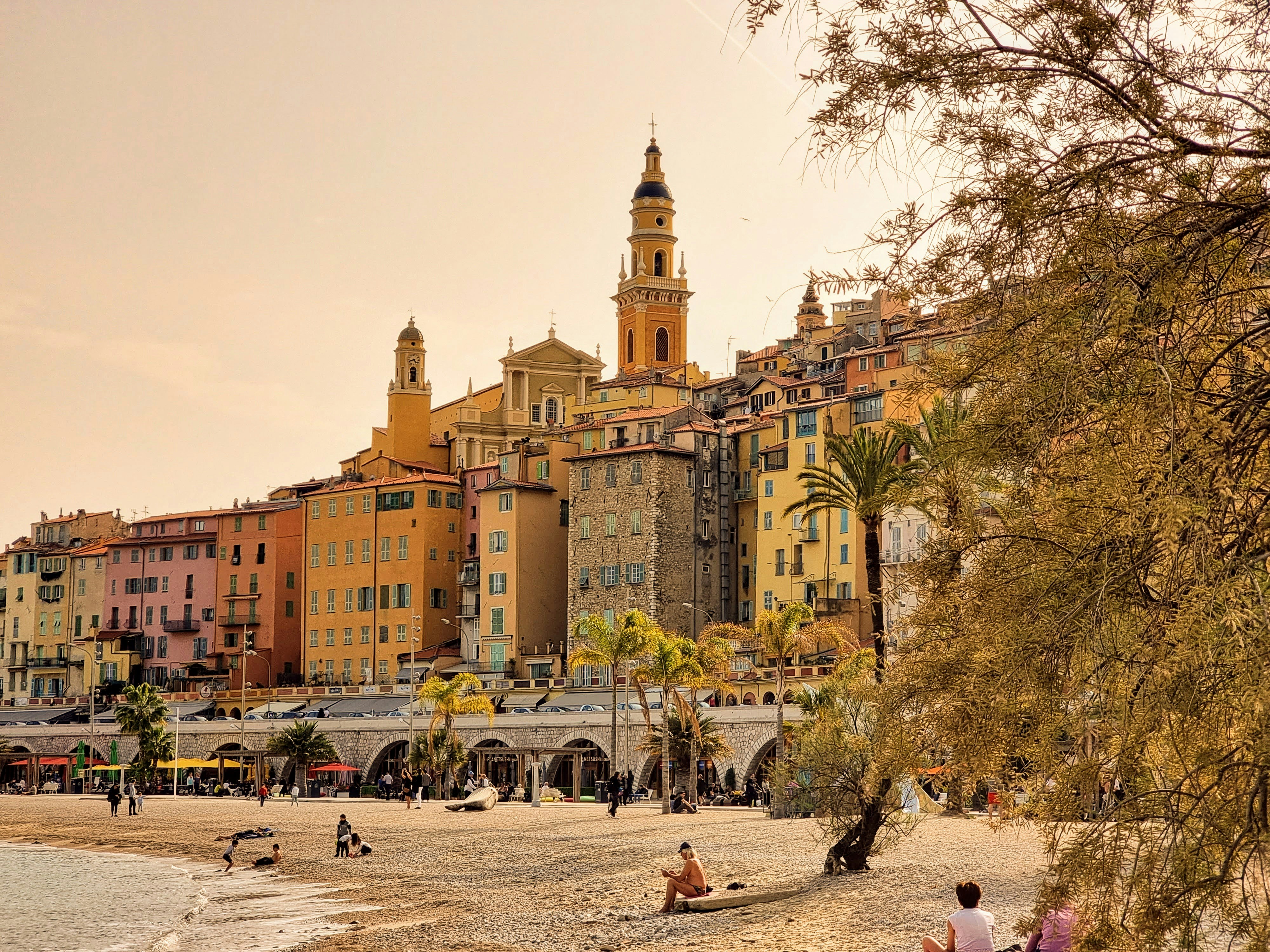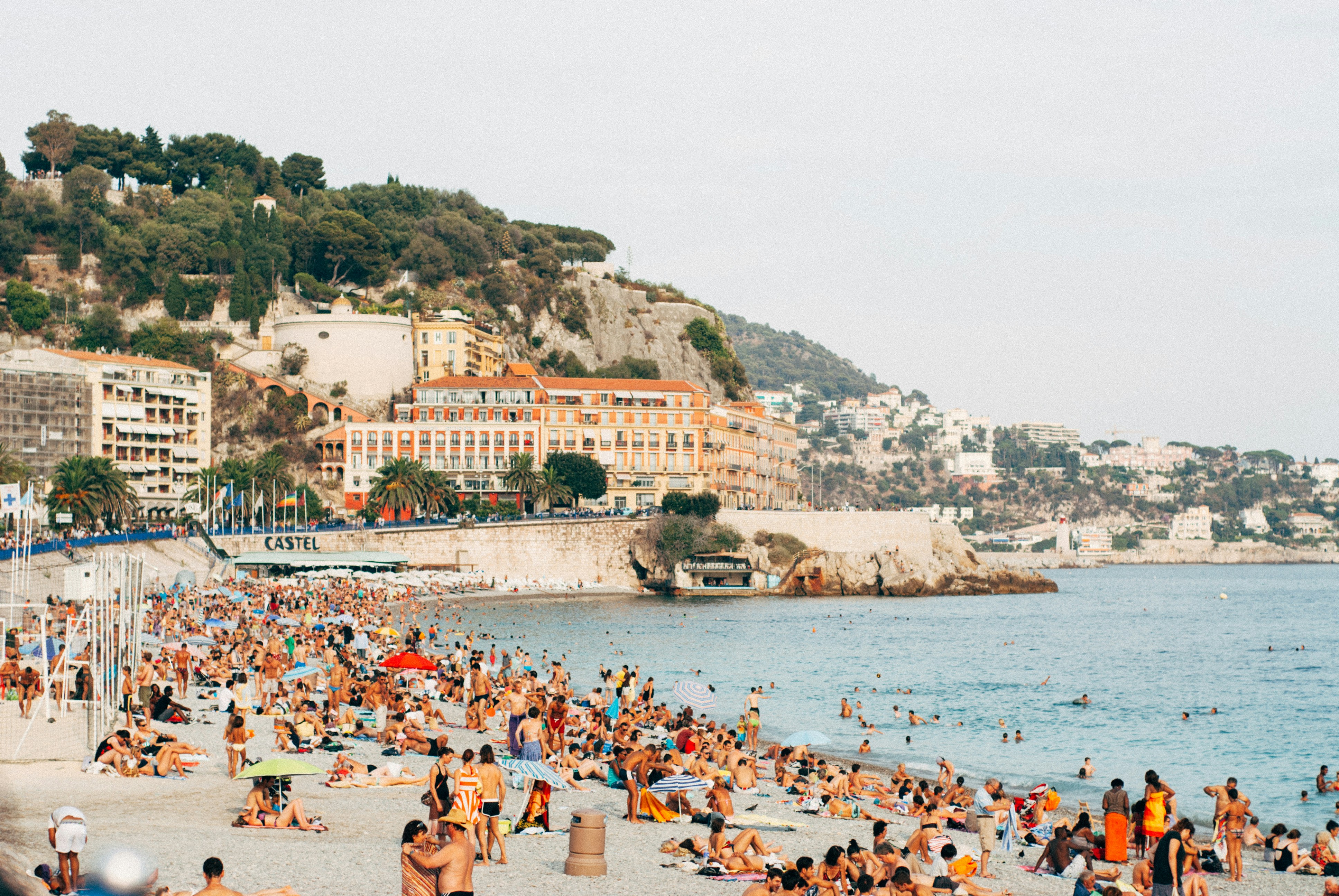French EU Blue Card (Carte Bleue Européenne) — Talent Passport

Quick Visa Facts
Visa length Up to 4 years, depending on your employment contract and passport validity.
Possible to extend? Yes, the EU Blue Card can be renewed as long as you continue to meet eligibility requirements.
Who can apply? Highly skilled non-EU nationals with a qualifying job offer in France that meets the minimum salary threshold.
Minimum Income Requirements Approximately €56,000 per year (~$61,000 USD)
Time for visa applications Typically 1–3 months, depending on the consulate or prefecture processing times.
Want to know if you can apply?
Complete a visa quiz and see if you qualify!
Dreaming of building your career in France while enjoying all the benefits of living in the European Union? The EU Blue Card, known in France as the Passeport Talent, Carte Bleue Européenne, was specifically designed for this purpose. It’s a residence permit created for highly qualified professionals from outside the EU who want to work, live, and settle in France.
What makes it special? Unlike a standard work visa, the EU Blue Card offers more than just the right to work in France, it also provides faster family reunification, long-term residence options, and mobility across EU Member States. In other words, it’s one of the most attractive pathways for skilled workers who want both professional opportunities and stability in Europe.
In this guide, we’ll walk you through everything you need to know about the French EU Blue Card: who it’s for, the eligibility requirements, how to apply, and the key advantages that set it apart from other permits.

EU Blue Card Visa Overview
The EU Blue Card (Carte Bleue Européenne) is a special type of residence permit available in France under the Passeport Talent scheme. It was first introduced in 2009 through an EU Directive, and updated in 2021 to make it more accessible to skilled workers worldwide. The goal is simple: to attract highly qualified non-EU professionals and make Europe more competitive in the global talent market.
Unlike a standard French work visa, the EU Blue Card provides extra benefits, such as longer validity, family reunification rights, and facilitated mobility across the EU. In France, it is valid for up to four years (renewable) and is tied to a specific employment contract.
Who Is It For?
The EU Blue Card is designed for non-EU/EEA/Swiss nationals who have:
A high level of professional qualifications (typically a university degree or equivalent professional experience).
A binding job offer or employment contract in France.
A salary that meets the required threshold, which is higher than the French average gross salary.
It’s particularly aimed at engineers, IT specialists, researchers, doctors, and other highly skilled professionals who want to continue their careers in France while enjoying the benefits of EU residence.
What Does It Allow You to Do?
With an EU Blue Card in France, you can:
Live and work in France legally under a contract with a French employer.
Bring your family members with simplified reunification procedures.
Renew your status and eventually apply for long-term EU residence or French permanent residence.
Move to another EU Member State (after a certain period) to take up qualified employment there, without starting from scratch.
In short, the EU Blue Card combines the stability of a residence permit with the flexibility of European mobility, making it one of the most attractive visas for professionals planning a long-term future in France and beyond.

EU Blue Card Visa Requirements
When applying for the EU Blue Card (Carte Bleue Européenne) in France, you’ll need to prepare a complete application file. Below is a list of the basic documents required, followed by the key conditions that carry the most weight in your application.
Basic documents required:
Completed application form.
Two recent passport-sized photos meeting French visa photo standards.
A valid passport (with copies of all pages containing visas, stamps, and personal details).
A copy of your long-stay visa (if applicable).
Proof of residence in France (such as a lease, utility bill, or attestation d’hébergement).
Civil status documents (e.g., birth certificate, marriage certificate if applicable).
Application fee payment receipt.
Proof of Professional Qualifications
Applicants must provide:
A university degree (at least three years of higher education) or proof of at least five years of professional experience in the relevant field.
Any required professional licenses or certifications (if the job is in a regulated profession).
Work Contract or Job Offer
A signed employment contract or binding job offer is mandatory. In France, this must:
Be valid for at least one year.
Offer a gross annual salary of at least €56,000 per year (~$61,000 USD), which equals 1.5× the national average salary.
Proof of Financial Self-Sufficiency
Your employment contract itself serves as proof of financial stability, but you may also be asked to provide:
Recent bank statements, or
Employer-issued salary attestation confirming compliance with the required salary threshold.
Private Health Insurance
Applicants must show proof of comprehensive health insurance covering themselves (and family members, if applicable) until they are fully integrated into the French social security system.
Travel insurance is not accepted; it must be long-term residency health insurance. You can find our recommendations for the best health insurance plans for digital nomads here.
Clean Criminal Record
As part of the application process, French authorities may request proof that you have no serious criminal convictions. This requirement ensures that applicants pose no threat to public policy, security, or health in France.

How to Apply for the EU Blue Card in France – Step-by-Step Instructions
Applying for the EU Blue Card (Carte Bleue Européenne) in France involves several stages, starting from your home country and continuing once you arrive in France. Below is a step-by-step guide to help you through the process.
Step 1 – Secure a Job Offer
The first step is to obtain a binding job offer or employment contract from a French employer. To qualify, the contract must last at least twelve months and meet the salary threshold of €56,000 (~$61,000 USD) gross per year. In addition, the position must be considered highly qualified employment, which generally means holding a recognized university degree or having at least five years of relevant professional experience.
Step 2 – Apply for a Long-Stay Visa
Once you have a valid job offer, you must apply for a long-stay visa (visa de long séjour) before traveling to France. This is done at the French consulate or embassy in your country of residence. At this stage, you will need to submit your completed application form, recent passport photos, your valid passport, proof of qualifications, and your signed employment contract. The application also requires payment of the visa fee.
Step 3 – Travel to France and Validate Your Visa
After your long-stay visa is approved, you may travel to France. Upon arrival, it is mandatory to validate your visa online with the French Office for Immigration and Integration (OFII) within the required timeframe. This validation confirms your legal right to remain in France and is a crucial step in the process.
Step 4 – Apply for the EU Blue Card Residence Permit
Once in France, the next step is to apply for your residence permit, officially known as the Carte de Séjour “Passeport Talent – Carte Bleue Européenne”. The application must be submitted at your local prefecture. You will be asked to provide supporting documents such as your passport, the validated visa, proof of residence in France, your employment contract and salary details, health insurance, and civil status records. At this point, you must also pay the residence permit fee of €269 (≈ $295 USD) using a fiscal stamp.
Step 5 – Receive Your EU Blue Card
If your application is successful, you will be issued the EU Blue Card. This residence permit is valid for up to four years, or for the duration of your employment contract if it is shorter. With the EU Blue Card, you gain the right to live and work in France, bring family members under simplified reunification procedures, and renew your permit if your professional situation remains stable.
Step 6 – Maintain Your Status
To keep your EU Blue Card status, you must continue to fulfill the visa requirements. This means ensuring your employment contract remains valid, maintaining a salary above the threshold, and notifying French authorities of any changes in your situation, such as a new employer or a period of unemployment. After several years of residence, you may become eligible for long-term EU residence or even permanent residency in France.

Stay Requirements for the EU Blue Card in France
Holders of the EU Blue Card (Carte Bleue Européenne) must meet specific stay requirements to maintain their residence status in France. Firstly, your employment must remain valid. The EU Blue Card is tied to your professional activity, so any significant interruption, such as resigning or losing your job, must be reported to the French authorities, and prolonged periods without employment could affect your status.
Your residence in France must also be continuous. While short trips abroad are allowed, you should not spend more than 12 consecutive months outside France during the validity of your Blue Card. Extended absences can impact your eligibility for card renewal or for long-term EU residence in the future.
Additionally, Blue Card holders must comply with French laws and regulations, including maintaining private health insurance coverage, paying taxes, and respecting civil obligations. Failing to meet these obligations can result in the revocation of your residence permit.
For family members accompanying the Blue Card holder, similar requirements apply. Family members must live in France with the primary cardholder, and their residence rights are dependent on the main Blue Card holder’s status.
By adhering to these stay requirements, EU Blue Card holders ensure they maintain their legal right to live and work in France and lay the groundwork for potential long-term residency.

How Much Does the EU Blue Card Cost?
Applying for the EU Blue Card (Carte Bleue Européenne) in France involves several fees, which cover both the visa application and the residence permit.
The long-stay visa application fee depends on your nationality but typically ranges around €99–€269 (≈ $108–$295 USD). This fee is paid when submitting your visa application at the French consulate or embassy in your home country.
Once in France, you will need to apply for the Carte de Séjour “Passeport Talent – Carte Bleue Européenne”. The residence permit fee is €269 (≈ $295 USD), which is paid using a fiscal stamp. In some prefectures, additional administrative fees may apply, so it’s always a good idea to confirm the exact amount before your appointment.
Other costs may include translation of documents, official certifications, or proof of health insurance, depending on your personal situation. While these are not mandatory fees for the card itself, they are often required as part of your complete application package.
Overall, the total cost for obtaining the EU Blue Card in France typically ranges from €368–€538 (≈ $403–$588 USD), including both the visa and residence permit, as well as potential administrative expenses.
Taxes for People With an EU Blue Card
Holders of the EU Blue Card (Carte Bleue Européenne) are considered residents for tax purposes once they live in France for more than 183 days in a calendar year or if France is their primary place of economic interest. As a result, you are generally required to declare and pay taxes on your worldwide income to the French tax authorities.
Your salary from your French employer is subject to income tax, which is progressive and ranges from 0% to 45% depending on your total annual income. Employers are responsible for withholding income tax at source, so the amount is automatically deducted from your salary each month.
In addition to income tax, EU Blue Card holders are typically required to pay social security contributions. These contributions cover health insurance, unemployment benefits, and retirement pensions. The total social charges usually amount to around 20–25% of your gross salary and are also deducted by your employer.
If you are a family member accompanying the Blue Card holder, your tax obligations will depend on your personal income. Spouses and children living in France may also be subject to French tax rules if they have independent income.
It’s important to note that France has double taxation treaties with many countries, which may prevent you from being taxed twice on the same income. Consulting the official French tax administration (DGFiP) resources or a qualified tax advisor can help ensure you meet all obligations and take advantage of any applicable tax agreements.

Living in France with the EU Blue Card
Living in France with the EU Blue Card (Carte Bleue Européenne) offers highly qualified professionals the opportunity to enjoy a comfortable and well-supported lifestyle. With the card, you have the right to reside and work in France, access public services, and bring family members under simplified reunification rules. This makes it easier to settle into French life while maintaining career growth and stability. Many Blue Card holders take advantage of France’s strong healthcare system, modern infrastructure, and rich cultural offerings, from world-renowned cuisine to vibrant arts and historical sites.
Beyond practical benefits, the EU Blue Card also provides flexibility for professional mobility within France and, in some cases, other EU member states. While you are expected to maintain employment that meets the minimum salary threshold, the card allows you to explore career opportunities and potentially transition to long-term EU residence after a few years. Living in France with the EU Blue Card combines professional advancement with the experience of daily life in one of Europe’s most dynamic countries, making it an attractive option for skilled workers worldwide.
Best Cities to Live in France
Paris

As the capital and economic hub of France, Paris is a top choice for EU Blue Card holders seeking vibrant career opportunities. Known for its international business presence, world-class cultural institutions, and extensive public transportation network, Paris offers both professional growth and an unparalleled lifestyle. While the cost of living is higher than in other French cities, the access to networking, education, and cultural experiences makes it ideal for highly skilled professionals.
Lyon

Lyon is France’s second-largest metropolitan area and a key center for finance, technology, and healthcare industries. The city is renowned for its quality of life, combining a rich historical heritage with modern infrastructure and a thriving culinary scene. For EU Blue Card holders, Lyon offers a slightly lower cost of living compared to Paris, excellent public transport, and numerous opportunities for professional development in diverse sectors.
Toulouse

Often called the “Pink City” due to its distinctive brick architecture, Toulouse is a major hub for aerospace, engineering, and research industries. The city provides a high quality of life, a strong sense of community, and vibrant student and expatriate networks. For Blue Card holders, Toulouse represents a balanced lifestyle with professional growth opportunities, affordable housing compared to Paris, and a welcoming environment for international professionals and their families.
Cost of Living
The official currency of France is the euro (€). 1 EUR = approximately $1.08 USD (exchange rates may vary).
The average net monthly salary in France is around €2,400, which equates to approximately $2,590 USD after taxes.
Here’s a rundown of what you should expect to pay in different cities:
Paris
Rent (1 bedroom in city center) – $1,500 per month
Rent (3 bedrooms outside city center) – $2,200 per month
Basic Utilities – $190 per month
Wi-Fi – $35 per month
Public Transport – $2.20 one-way
Groceries (2 people) – $500–$750 per month
Lyon
Rent (1 bedroom in city center) – $1,000 per month
Rent (3 bedrooms outside city center) – $1,600 per month
Basic Utilities – $160 per month
Wi-Fi – $30 per month
Public Transport – $2.00 one-way
Groceries (2 people) – $450–$650 per month
Toulouse
Rent (1 bedroom in city center) – $850 per month
Rent (3 bedrooms outside city center) – $1,400 per month
Basic Utilities – $150 per month
Wi-Fi – $30 per month
Public Transport – $1.90 one-way
Groceries (2 people) – $400–$600 per month
FAQs
How long is the EU Blue Card valid in France?
The EU Blue Card is initially issued for a period of up to four years, depending on your employment contract and passport validity. It can be renewed as long as you continue to meet the eligibility requirements, including employment and salary thresholds.
Can family members join me in France on the EU Blue Card?
Yes, the EU Blue Card allows family reunification. Your spouse, partner, and dependent children can join you in France and enjoy residence rights. Family members may also have the right to work or study, depending on their age and situation.
Do I need to speak French to get the EU Blue Card?
While there is no strict language requirement to obtain the EU Blue Card, having a basic knowledge of French is highly recommended. It helps with daily life, integration, and employment opportunities, especially outside major international cities.
Can I move to another EU country with the Blue Card?
After 18 months of holding the EU Blue Card in France, you may apply to move to another EU country for highly skilled employment. Each country has its own application process, and you will need to meet that country’s specific Blue Card requirements.
What happens if I lose my job while holding the Blue Card?
If you lose your job, you are generally allowed a short period (usually three months) to find new employment that meets the minimum salary requirement. Failing to secure qualifying employment within that period may affect your Blue Card status, so it’s crucial to stay in compliance with the regulations.
Can I get help applying for the French EU Blue Card?
If you need help applying for a visa, you can talk to Citizen Remote. Get specific advice from one of our experts, or outsource the entire application to our team.
Author
Nadia Dardón is a content creator from Guatemala. She has worked fully remotely for the past six years as a copywriter, editor, and content creator, working for different industries. She started her digital nomad journey in 2022 and currently lives as an expat in Spain.
